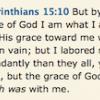Submitter
Follow @BibleSupportSUPPORT TOPIC File Information
- Submitted: Oct 18 2012 08:18 PM
- Last Updated: Oct 18 2012 08:24 PM
- File Size: 5.08MB
- Views: 13943
- Downloads: 5,222
- Author: Emil Schurer
- e-Sword Version: 10.x
Support BibleSupport.com
-
If our e-Sword and MySword modules have blessed you, please consider a small donation.
Your donation pays only for dedicated server hosting, bandwidth, software licenses, and capital equipment (scanners, OCR equipment, etc).
Other Modules By Same Author
- No modules found
e-Sword 10 Module Download:
Download
Schurer, Emil - The Jewish People in the Time of Jesus Christ (5 Volumes)




 11 Votes
11 Votes
History
Author:
Emil Schurer
e-Sword Version:
10.x
Schurer's landmark work has been a trusted source of Jewish history for over 100 years. Providing a glimpse into the world in which Jesus and the apostolic fathers conducted their ministry, this authoritative and scholarly 5 volume collection documents the Jewish people in the time before and after the life of Jesus Christ.
The power of this work is such that even after almost 100 year since it has been written, Encyclopedia Britannica still found it possible to call this work: "The most valuable general modern work (on the subject)".
This classic work includes substantial essays on the Roman political and religious parties of Judaism, messianic movements, and pertinent Greek and Jewish literature—including the Apocrypha and Pseudepigrapha—from the centuries before and after Christ.
This is one of the most often sited works on the Second Temple period. Although it addresses Christians and scholars interested in the Jewish setting of early Christianity, its comprehensiveness makes it an invaluable aid to the general study of events in the Land of Israel at the time of Roman occupation. The work combines broad analysis of the religious, political, social, and economic dynamics that shaped both Judaism and Christianity together with incredible mass of useful facts.
The present generation of humanity is privileged to live at the time of the Second Restoration of the Jewish state with all the benefits and problems brought about by its existence. Many of the problems that the Jewish people have to deal with today find their echo in the situation that existed more then 2,000 years ago in that same part of the world. There is much that this ancient history has to teach us and there is not many books like this, from which we can learn so much.
The collection is meant more for serious (or academic) study of the Jewish people, than just casual reading.
This is a valuable addition to any minister's or serious Bible student's library. Such meticulous documentation is rare in more modern reference works. This set offers a wealth of background toward understanding the historical setting of the Bible.
About SCHÜRER, EMIL (1844 - 1910)
German Protestant theologian, was born at Augsburg on the 2nd of May 1844. After studying at Erlangen, Berlin and Heidelberg from 1862 to 1866, he became in 1873 professor at Leipzig and eventually (1895) professor at Gottingen. In 1876 he founded and edited the Theologische Literaturzeitung, arid from 1881 to 1910 he edited it with Adolf Harnack. The translation of his elaborate work on the history of the Jews in the time of Jesus of Nazareth (Geschichte des judischen Volks im Zeitalter Jesu Christi) made him in Great Britain and America one of the best known of German scholars. He died after a long illness on the 30th of April 1910.
Table of Contents
Title Page
Preface
Prepared By Biblesupport.Com
Introduction
-----§ 1. Scope And Literature
-----§ 2. Auxiliary Sciences
--------A.Jewish Archaeology
--------B.Geography
--------C.Chronology
--------D.Numismatics
--------E.Inscriptions
-----§ 3. The Sources
--------A.The Two Books Of Maccabees
--------B.Non-Extant Sources
--------C.Josephus
--------D.Greek And Roman Writers
--------E.The Rabbinical Literature
First Division
-----First Period
--------The Rise Of The Maccabees And The Period Of Freedom, B.C. 175-63
--------A Sketch Of The History Of Syria During The Last Century Of The Seleucid Dynasty, B....
--------§ 4. Religious Destitution And Revival, B.C. 175-165
--------§ 5. The Times Of Judas Maccabaeus, B.C. 165-161
--------§ 6. The Times Of Jonathan, B.C. 161-143
--------§ 7. Simon, B.C. 142-135
--------§ 8. John Hyrcanus I., B.C. 135-105
--------§ 9. Aristobulus I., B.C. 105-104
--------§ 10. Alexander Jannaus, B.C. 104-78
--------§ 11. Alexandra, B.C. 78-69
--------§ 12. Aristobulus II., B.C. 69-63
Second Period
--------The Roman-Herodian Age, B.C. 63-A.D. 135
--------Sketch Of The History Of The Roman Province Of Syria, B.C. 65-A.D. 70
--------§ 13. Hyrcanus II, B.C. 63-40. Rebellion Of Antipater And His Sons Phasael And Herod
--------§ 14. Antigonus, B.C. 40-37
--------§ 15. Herod The Great, B.C. 37-4
--------§ 16. Disturbances After Herod's Death, B.C. 4
--------§ 17. The Sons Of Herod
--------§ 18. Herod Agrippa I., A.D. 37, 40, 41-44
--------§ 19. The Roman Procurators, A.D. 44-66
--------§ 20. The Great War With Rome, A.D. 66-73
--------§ 21. From The Destruction Of Jerusalem To The Overthrow Of Bar-Cochba
-----Appendices I-VIII
--------Appendix I
--------Appendix II
--------Appendix III
--------Appendix IV
--------Appendix V
--------Appendix VI
--------APPENDIX VII
--------APPENDIX VIII
Second Division
-----§ 22. The State Of Culture In General
--------I. Mixture Of Population, Language
--------II. Diffusion Of Hellenic Culture
-----§ 23. Constitution. Sanhedrim. High Priest
--------I. The Hellenistic Towns
--------II. The Strictly Jewish Territory
--------III. The Supreme Sanhedrim In Jerusalem
--------IV. The High Priests
-----§ 24. The Priesthood And The Temple Worship
--------I. The Priesthood As A Distinct Order
--------II. The Emoluments
--------III. The Various Functions Of The Priesthood
--------IV. The Daily Service
--------Appendix
-----§ 25. Scribism
--------I. Canonical Dignity Of Holy Scripture
--------II. The Scribes And Their Labours In General
--------III. Halachah And Haggadah
--------IV. The Most Famous Scribes
-----§ 26. Pharisees And Sadducees
--------I. The Pharisees
--------II. The Sadducees
-----§ 27. School And Synagogue
--------I. The School
--------II. The Synagogue
--------Appendix
-----§ 28. Life Under The Law
-----§ 29. The Messianic Hope
--------I. Relation To The Older Messianic Hope
--------II. Historical Survey
--------III. Systematic Statement
-----§ 30. The Essenes
--------I. The Facts
--------II. Nature And Origin Of Essenism
-----§ 31. Judaism In The Dispersion. Proselytes
--------I. Extension
--------II. Constitution Of The Jewish Communities
-----§ 32. The Palestinian Jewish Literature
--------I. Historiography
--------II. The Psalmodic Literature
--------III. The Gnomic Wisdom
--------IV. Hortatory Narrative
--------V. Pseudepigraphic Prophecies
--------VI. The Sacred Legends
--------VII. Books Of Magic And Magical Spells
-----§ 33. The Graeco-Jewish Literature
--------I. Translations Of The Holy Scriptures
--------II. Revision And Completion Of Scripture Literature
--------III. Historical Literature
--------IV. Epic Poetry And The Drama
--------V. Philosophy
--------VII. Jewish Propaganda Under A Heathen Mask
-----§ 34. Philo The Jewish Philosopher
--------I. The Life And Writings Of Philo
--------II. The Doctrine Of Philo
Thanks Josh for this work.
The more I get into the studies, the more I find I have to learn.
And works such as this one help my understanding of scripture.
Virgil
Just a tad of an explanatory note:
For of you who are not German, there a couple of consonance in the German language that are pronounced totally different from how they are pronounced in English.
The "W." In German it is pronounced as a "V," for example, Water in German is "Wasser." And the "V" is pronounced as an "F." The best example for that is, "Volks (Folks).
Remember the VW Beetle car. That is the Volks (Folks) Wagen (vagen).
So, just remember that when it comes to reading German, some of the consonance are really pronounced differently from the way it is in English.
Blessings,
Stephen (Php 1:21).
Other files you may be interested in ..
- 8,222 Total Files
- 50 Total Categories
- 273 Total Contributors
- 5,878,308 Total Downloads
- Nabaza, William R. - Out Of Her Poverty by: Weblord William R. Nabaza Latest File
- weblord Latest Submitter
14 user(s) are online (in the past 30 minutes)
2 members, 11 guests, 0 anonymous users




















Thank you! This is a very helpful module. God bless you!